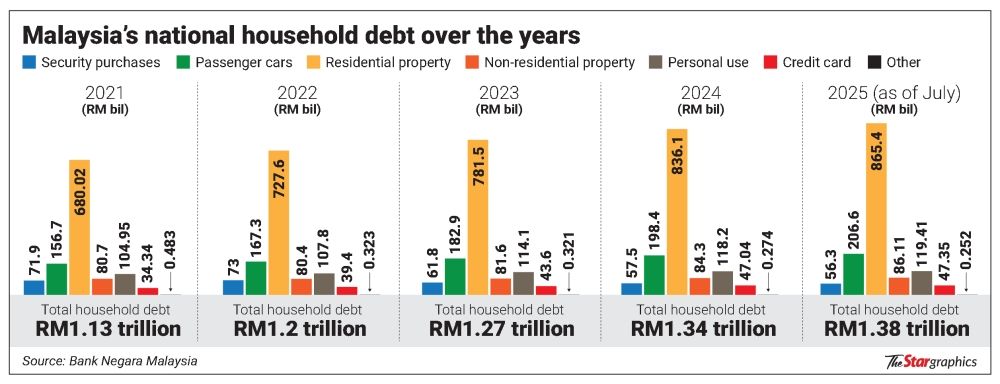Chow (second left) looking at a series of Malaysian banknotes with Abdul Rasheed (left) at the Financial Literacy Carnival in Queensbay Mall. — Photos: CHAN BOON KAI/The Star
A FINANCIAL literacy and awareness carnival by Bank Negara Malaysia (BNM) in Penang provided visitors with insight into online scams, insurance coverage and banking services.
Sales adviser Tammy Teh, 44, and her family liked the fun games and information provided by the various agencies, banks and companies.
“We were at the mall to eat and noticed booths set up all over.
“It is a good event as I have learnt quite a bit about how to make my money grow and protect it.
“We also didn’t realise how quickly one can fall for an online scam,” she said when met at the three-day event at Queensbay Mall.
Businessman David Yu, 49, and his daughter, Yu Shin Chi, 11, learnt how to avoid phone scammers and keep personal details safe.
“It was a fruitful day for me and my daughter.
“Usually, when I go to the shops to do it, they charge a sum or turn me away.
“I am a simple businessman who does not go out much, but a fair like this at a popular mall gives us the opportunity to learn new things,” he said.
The final event of the Finan-cial Literacy Month 2025, spearheaded by the Financial Education Network, saw 39 booths offering fun games and advice.
BNM governor Datuk Abdul Rasheed Ghaffour said in his speech at the opening ceremony that like many countries, Malaysia faced challenges related to the cost of living, changes in the job landscape and technologies that evolve faster than people can adapt.
“In such circumstances, financial literacy becomes a core skill that helps people think carefully before spending.
“It helps them make sound financial decisions and build household resilience.
“Financial knowledge helps us understand our true needs, avoid excessive debt and be prepared for emergencies.”
Rasheed said the country had rapidly shifted into digital finance with almost nine out of 10 Malaysians using online services for payments, banking and insurance.
“This convenience however is accompanied by heightened exposure to scams, many of which are now powered by artificial intelligence that can mimic people’s voices and faces.
“Do not share personal information, check before you click and think before you pay.
“While we continue to strengthen cybersecurity with industry players and enforcement agencies, public awareness remains the strongest line of defence,” he said.
Penang Chief Minister Chow Kon Yeow, who was also the guest of honour, said financial literacy should reach all segments of society including students, factory workers, traders, retirees and housewives.
“A society that is financially literate not only protects its members from financial risks, but also builds the foundation for a stronger state economy,” said Chow.







